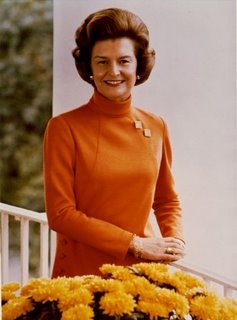Why Did Americans Love Betty Ford?

Gerald Ford was often knocked as a klutz and criticized for pardoning Richard Nixon, the man who made him the first person to serve as President without being elected. But Betty Ford was considered a hero by millions. She was an iconoclast who shocked some people, but inspired millions more with her frank talk about sensitive subjects, making her one of the most admired women of the decade.
Elizabeth Ann Bloomer was born in Chicago, but grew up in Grand Rapids. A talented dancer, she studied under Martha Graham and eventually moved to Manhattan, where she worked briefly as a model before returning to her home town to teach dance and become a manager in a department store. This was not your typical career path for a respectable Midwestern girl born in 1918, but perhaps it says something about BettyÂs sense of independence. In 1948 she married (for the second time) a Yale Law School graduate and college football star named Gerald Ford, who soon after made a successful run for Congress. Gerald rose to be the highest ranking Republican Congressman in America.
When looking at the political situation during the Seventies it helps to remember that the major parties were not ideological monoliths, and Ford could probably be considered a fairly moderate Republican by today's standards, one who drew little national attention. That was to change on October 10, 1973, when Spiro T. Agnew was forced to resign his position as Vice President following charges of tax evasion and bribery while he was Governor of Maryland. (This was the same Agnew who branded the press as an "effete corps of impudent snobs.") For whatever reason, Richard Nixon selected Ford to be his new Veep. As the Watergate scandal unfolded, many of us knew what was coming, and on August 9, 1974 Tricky Dick resigned, leaving Gerald and Betty in the White House.
In marked contrast to the usually passive Patricia Nixon, Betty Ford showed herself to be probably the most outspoken First Lady since Eleanor Roosevelt, although some of her statements would be considered fairly tame by today's standards. For example, during a televised tour of the White House, she shocked many Americans by mentioning that she and Gerald slept in the same bed. Soon afterwards, she made an appearance on "Sixty Minutes" in which she, while not exactly speaking in favor of premarital sex, indicated that she did not regard it so harshly. This, as well as her comments on marijuana, her acknowledgement that she had undergone psychiatric treatment and her support of the Equal Rights Amendment, generated some 30,000 letters to CBS regarding her appearance. Some people even called for her "resignation," although how a President's wife can "resign" was not specified. (So much for Family Values).
While the reactionaries were fuming, Betty Ford's popularity was soaring. She arranged for Martha Graham to be awarded the Presidential Medal of Freedom. Soon afterwards she underwent a mastectomy, and became an outspoken advocate for women with breast cancer at a time when the disease was not discussed much in the media. While many politicians regarded her as a liability to her husband's career, Jerry stood by her, and during the 1976 election (which Ford lost to Carter) there were even bumper stickers reading "Betty Ford's Husband for President."
In 1978, after she and Jerry had retired from public office, Betty entered a treatment program due to her addiction to alcohol and opiate drugs. As she did previously with cancer, she turned this event into an opportunity to educate and help others, and a few years later opened the Betty Ford Center, probably the most well-known addiction treatment facilities in the world. `
Betty Ford's popularity transcended political lines. In an era when most "First Ladies" were little more than mouthpieces for their husbands and glorified corporate wives, she was a real hero.

0 Comments:
Post a Comment
Subscribe to Post Comments [Atom]
<< Home